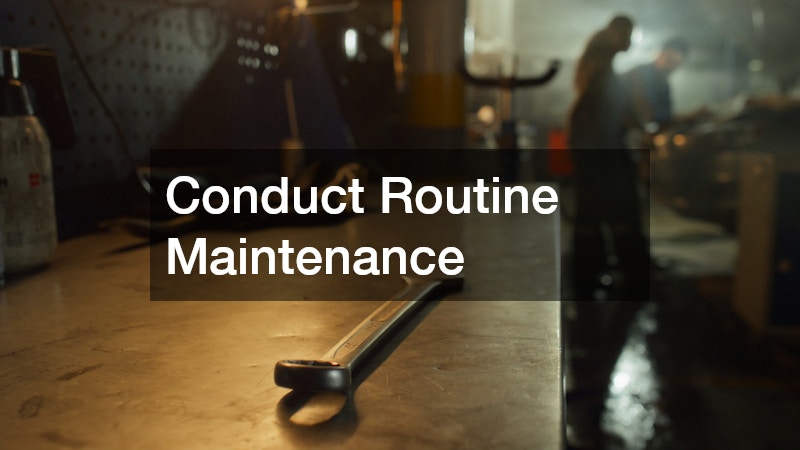In the fast-paced world we live in, auto maintenance often takes a backseat to our daily schedules. However, neglecting the details of vehicle care can lead to significant expenses and potential dangers on the road. Understanding the importance of remembering specific aspects of all maintenance can ensure you keep your vehicle in optimal condition, prevent costly repairs, and improve your overall safety while driving.
By being proactive and informed, drivers can not only save money but also ensure their vehicle operates efficiently. Maintenance shops see a variety of issues brought to them, many of which could have been prevented with the right knowledge. This article will guide you through 10 key details that all maintenance shops want you to remember, making car care a priority rather than an afterthought.
1. Budget for Services

All maintenance should include a well-thought-out budget to manage your vehicle’s needs effectively. Set a monthly or annual figure for all maintenance services, including routine check-ups, repairs, and unexpected emergencies. By having a budget, you’re less likely to be caught off guard by expensive repairs or service bills.
Consider different types of services you might need, such as auto glass repair service, exhaust repair, and regular checks for brakes. Each of these elements can add up, so it’s vital to plan and allocate funds accordingly. Moreover, a well-planned budget allows you to prioritize services without feeling financial strain.
Remember that being proactive about your finances can lead to better decision-making in terms of your vehicle’s care. By allocating funds for preventive maintenance, you can avoid larger issues down the line. Ultimately, budgeting appropriately ensures that you keep your vehicle in prime condition without breaking the bank.
2. Listen to Your Vehicle
Your vehicle often communicates its needs through sounds and sensations, making it crucial to listen closely. Unusual noises like grinding, whining, or squeaking can indicate issues with the brakes or other critical components. Recognizing these sounds is part of all maintenance and can lead to early detection of problems.
Understanding your vehicle’s normal sounds helps you identify when something is off, potentially saving you from costly repairs. For instance, a change in the sound of your exhaust system might signal a need for exhaust repair. By remaining attentive, you can catch minor issues before they escalate into major problems.
In addition to sounds, pay attention to vibrations, smells, and performance changes. These can also indicate maintenance needs, prompting you to visit a collision repair center or your mechanic for further evaluation. Your ability to listen to your vehicle may well serve as the first line of defense in maintaining its health.
3. Get a Professional Assessment
Following an auto accident, obtaining a professional assessment is essential for your vehicle’s safety and longevity. Many drivers underestimate the damage their vehicle may have sustained; however, collision repair centers specialize in identifying these issues comprehensively. Having your car evaluated ensures that any hidden damage is addressed promptly, improving your vehicle’s reliability.
A profound understanding of the extent of the accident’s impact can also aid your car accident attorney if needed. Documenting damages properly can significantly support any legal claims you may encounter. Consequently, a professional can provide a thorough examination, giving you peace of mind about your vehicle’s condition.
Incorporating professional assessments into your regular maintenance routine increases your car’s longevity and enhances your driving experience. By making it a point to get evaluations, especially after incidents, you’ll be better equipped to deal with repairs and ensure the safety of your vehicle. Ultimately, timely assessments can save you money in the long run.
4. Conduct Routine Maintenance

Routine maintenance is a cornerstone of all maintenance practices and cannot be overstated. Making regular trips to your mechanic helps catch minor problems before they turn into significant issues requiring extensive repairs. This proactive approach can save you both time and money.
Elements such as oil changes, tire rotations, and brake inspections fall under the umbrella of routine maintenance. Scheduling services regularly ensures your vehicle runs efficiently and sturdily. Each of these tasks plays a vital role in your car’s performance and longevity.
Additionally, making minor repairs when necessary can help you avoid significant breakdowns in the long run. Whether it’s a simple fluid replacement or a more involved brake adjustment, addressing these issues timely is crucial. Regular inspections not only maintain the performance of your vehicle but also ensure you’re safe on the road.
5. Prioritize Repairs
When problems arise, it’s important to prioritize repairs to avoid further damage to your vehicle. Delaying repairs can lead to more severe issues, resulting in higher repair costs or unsafe driving conditions. All maintenance requires timely interventions for optimal vehicle performance.
For example, ignoring a warning light on your dashboard can lead to engine failure or transmission problems if not attended to quickly. Similarly, worn brakes can compromise your safety, making immediate attention essential. Therefore, addressing repairs promptly can prevent escalation into more substantial, costly issues.
By keeping a keen eye on your vehicle’s performance and taking swift action on repairs, you can enhance your driving experience significantly. Prioritizing repairs not just maintains your car but ensures you’re driving safely. Ultimately, this will keep your vehicle running smoothly and lengthen its lifespan.
6. Seek Legal Assistance
After being involved in a car accident, seeking legal assistance from auto accident legal services can be a wise decision. Understanding your rights and potential claims after a collision is crucial. An experienced car accident attorney will guide you through the nuances of your case and help you make informed decisions.
Having legal representation ensures that any representative can adequately advocate for compensation, repairs, and other needs arising from the accident. This is particularly crucial if your vehicle sustains significant damage that may require repairs from a professional collision repair center. Navigating the legal landscape can be complex, but having an expert by your side is invaluable.
Additionally, legal experts can offer insights into the potential long-term effects of the accident on your driving and vehicle usage. This kind of understanding can minimize your stress and empower you to focus on recovery and getting your vehicle back on the road. Don’t underestimate the role of legal assistance when dealing with the aftermath of a car accident and all maintenance needs.
7. Come in After an Accident

Visiting your mechanic immediately after an accident is a crucial step in assessing the damage to your vehicle. Mechanics can help provide a detailed account of the total impact, which can be invaluable to your insurance claim or legal case. This professional perspective ensures that all necessary repairs get documented accurately for any car accident attorney you might engage.
Involving a professional soon after an incident also helps in understanding the operational capabilities of your vehicle post-collision. Damage that’s not easily visible can still impact critical functions, and mechanics are trained to evaluate these concerns meticulously. Having this information not only aids in swift repairs, but also significantly impacts your safety and reliability on the road.
Moreover, your mechanic can advise you on practical next steps, including whether your vehicle is worth repairing or if you should consider options like “cash for cars” programs, should the repairs be too extensive. This approach not only saves you time but also streamlines your path to recovery and decision-making after an accident. Making that visit post-collision is essential to maintaining the integrity of your vehicle and overall safety.
8. Remember to Breathe
Car issues can be stressful, especially when they involve significant repairs or accidents. It’s essential to take a moment to breathe and process the situation calmly. Staying composed will help you make more rational decisions regarding your vehicle, including whether to pursue repairs or consider options for getting cash for your car.
Additionally, panicking can lead to hasty choices that may not serve your best interests when considering auto repairs. For instance, you might be tempted to ignore problems or defer necessary repairs, which can exacerbate the situation. By taking a step back and evaluating your circumstances, you can navigate the options thoughtfully.
You may also want to consult with knowledgeable professionals or trusted friends for advice, to help ease your decision-making process. Whether it’s discussing your repair options or exploring cash for cars offers, having a plan can help mitigate some stress. Remember to prioritize your emotional well-being while dealing with vehicle maintenance and repairs.
9. Stay Flexible
Having a flexible mindset while discussing your vehicle’s state with your mechanic is imperative. Sometimes, the reality of repairs can be less favorable than initially expected, meaning you might need to adapt your approach. For instance, your mechanic might indicate that certain repairs won’t be cost-effective, prompting you to consider selling your vehicle instead.
Flexibility allows you to weigh options thoughtfully, which could include everything from extensive repairs to exploring cash for your car opportunities. Embracing this adaptability can lead to better decision-making in terms of your vehicle’s maintenance and how you ultimately navigate any major repairs or sales. Always be open to the possibility of change, especially when it comes to your vehicle’s condition.
Furthermore, keeping an open mind may also lead you to unexpected solutions like auto recycling if repairs aren’t feasible. Many people overlook the importance of considering all angles regarding their vehicle’s future. By remaining fluid in your approach, you enhance your chances of finding the best pathway forward.
10. Consider Your Options

Weighing your options is a significant aspect of all maintenance, especially when faced with extensive repairs or a declining vehicle performance. It is pivotal to contemplate whether repairs are viable or if alternative options, such as auto recycling, are more suitable. An honest assessment can save you from pouring unnecessary resources into a vehicle that may no longer be reliable.
Beyond repairs, consider the possibility of selling your vehicle if repairs are too costly—programs offering cash for cars can be beneficial in this scenario. Often, vehicles can be turned into valuable assets even at the end of their operational lives. Furthermore, recycling cars presents not just a financial incentive but also offers environmentally friendly alternatives.
Ultimately, having a broader perspective on your vehicle’s future will help you make effective decisions regarding maintenance, repairs, or selling. By keeping abreast of all maintenance options, you ensure that your next steps align with both your financial plan and your vehicle’s best interests. Therefore, conducting thorough evaluations is essential for your overall peace of mind and financial health.
Understanding the details of all maintenance is crucial for ensuring the longevity and safety of your vehicle. Budgeting for services, prioritizing repairs, and utilizing professional assessments can significantly impact your car’s performance. By staying flexible and considering all options, you can navigate the complex world of auto maintenance with confidence, ensuring you’re well-prepared whether addressing repairs or exploring cash for cars opportunities.
